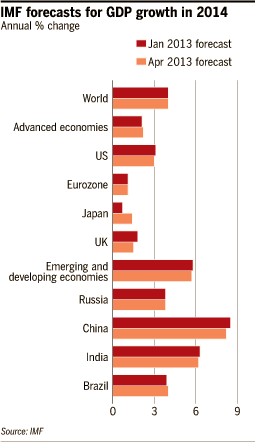|
The International Monetary Fund (IMF) announced its forecast for China's economic growth at 8 percent in 2013, lower than the 8.2-percent estimate it had given in January.

In its twice-yearly World Economic Outlook report released on April 16, the Washington, D.C.-based IMF also cut its 2014 forecast for China's GDP from 8.5 percent to 8.2 percent.
The report did not give a reason for the decision.
"We're still trying to understand the data because some of the high-frequency indicators with respect to investment and consumption suggested more strength than what has happened in the GDP data," Jorg Decressin, Deputy Director of the IMF Research Department, told a news conference before the upcoming spring meetings of the IMF and the World Bank starting April 19.
The data came out one day after China's National Bureau of Statistics (NBS) released information showing a surprisingly weak 7.7-percent first quarter GDP growth.
"Industrial production is unexpectedly weak and that's the source of weakness in GDP," Tim Condon, head of Asian economic research at ING in Singapore, told Reuters. "Based on this, the consensus forecasts for GDP are going to be headed lower."
The IMF said financial imbalances and rising asset prices could disrupt the region's growth outlook.
"In China, the use of more market-based financial instruments means that about half of financial intermediation now takes place outside traditional banking channels in less-well-supervised parts of the financial system," the report added.
China's 2012 economic growth of 7.8 percent was its slowest in 13 years owing to weakness in domestic and overseas markets.
Sheng Laiyun, spokesman at NBS told the press that China's economic fundamentals hadn't changed. "We are confident about future growth and optimistic about achieving this year's growth target," Sheng said.
China set a 7.5-percent GDP growth target this year during the "Two Sessions," namely the National People's Congress and Chinese People's Political Consultative Conference, which ended in mid-March. The target is intended to help create jobs, improve people's well-being, and leave room for economic restructuring, said then Premier Wen Jiabao while delivering his last government work report.
Even though downgrading the 2013 growth forecast, the IMF was optimistic that a stronger recovery was now on track.
The report recognized China's policies "aimed at moderating and better balancing growth." It believed that the "8 percent" reflects "continued robust domestic demand in both consumption and investment and renewed external demand."
Leading the global recovery are emerging economies, the IMF said.
(Reporting from Washington, D.C.) | 